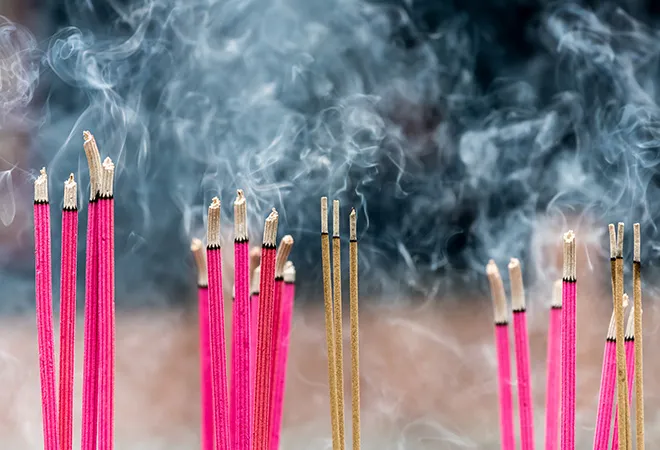-
CENTRES
Progammes & Centres
Location

There is an indisputable groundswell of anger among Indians against China. Simmering rage over the PLA’s attempt to grab land – through by now familiar stealth and deceit – along the Line of Actual Control in east Ladakh, turned incandescent after the deadly clash on the night of June 15-16 that resulted in the death of 20 Indian soldiers and a large number of Chinese ‘wolf warriors’. It would not be an exaggeration to suggest that the intensity of the popular rage sweeping through India will influence domestic politics and Government’s decision-making in the short to medium-term.
The implications of those decisions will last longer, unless Government does a somersault and reverses policy choices like imposing a ban on Chinese apps, cancelling infrastructure tenders in which Chinese firms are bidders, shutting India’s doors on China’s 5G tech firm Huawei, and prohibiting Chinese direct investment through the automatic route. For the moment, the Modi Government, slighted by what it perceives as Beijing’s treachery along the LAC and in instigating the neighbourhood, especially Nepal, against India at a time when all attention is focussed on fighting the Chinese-origin Covid19 pandemic and its devastating aftermath, seems determined to stay the course and be firm in dealing with a country which is unlikely to ever turn into a friend from an implacable foe.
Meanwhile, pressure from BJP-allied organisations like the Swadeshi Jagran Manch, and its ideological mentor, the RSS, will mount to hit China where it hurts most – Chinese exports to India. There are already raucous demands to cut back on India-China trade. This is in tune with Prime Minister Narendra Modi’s call for ‘Atmanirbhar Bharat’ or self-reliant India. Early evidence indicates that freezing out China from bilateral trade and shifting to self-reliance as a core principle of India’s national economy are gaining traction among the masses, more so in the wake of what Mr Modi aptly described as China’s unbridled “expansionism”.
"Early evidence indicates that freezing out China from bilateral trade and shifting to self-reliance as a core principle of India’s national economy are gaining traction among the masses, more so in the wake of what Mr Modi aptly described as China’s unbridled “expansionism”."
Quick to sense the popular mood, businesses with high-value brand equity have signalled their willingness to delink their production lines from Chinese supplies. Hero Cycles has called off a Rs 900-crore deal with China. It now plans to look at Europe. JSW Steel has declared it will stop importing all raw material from China over the next two years. TTK Prestige, possibly the most-known home appliances manufacturer, has decided to stop all imports from China by September this year. Then of course there is the Jio Platform which is not only free of all ‘Made in China’ clutter but has demonstrated to the world that India Tech is more than body-shopping and cut-price coding.
It’s not only Indian big business that is willing to look at alternatives other than Chinese supplies. Traders too are robustly waving the flag of nationalism, ignoring profit margins and quick returns on investments. The Confederation of All-India Traders has called for a boycott of Chinese ‘rakhis’ and material used for making them sourced from China. The confederation says this alone will dent Chinese earnings from Indian imports by Rs 4,000 crore. That India feels the necessity to import ‘rakhis’ from China, that the simple thread which once symbolised the sacred bond between a brother and a sister is now replaced by garish tassel and tinsel from a Chinese sweatshop, is a fact that needs to sink in, and sink in deep.
The confederation plans to reduce the import of cheap Chinese goods like toys, watches, corporate gifts and fabric by Rs 1 lakh crore over the next year. Online retailers will now make it mandatory for sellers to mention the country of origin of their merchandise. If the current level of revulsion against China and the urge to punish Beijing prevails, sellers would find it difficult to get rid of their inventory even at heavily discounted prices.
"If the current level of revulsion against China and the urge to punish Beijing prevails, sellers would find it difficult to get rid of their inventory even at heavily discounted prices."
All this and more sounds like distant ‘spring thunder’, a phrase the Communist Party of China is well acquainted with. If the thunder turns into a storm then China is bound to feel the backlash for its unwarranted hostility along the LAC as well as for upping the ante against India in the latter’s zone of influence. There is a second proviso: While diplomacy, whether it is cynical or coercive, is always preferable to a military response to China’s insatiable greed for land, India must not waver in its resolve to stand up to the bully on the block. As past experience has shown, capitulation comes easy to New Delhi – there are far too many China and strategic affairs ‘experts’ within and outside the establishment who are steeped in the twin Nehruvian orthodoxy of nonalignment and Panchsheel bunkum than is good for India’s national interest.
For India to stay firm and stay the course, Indians have to show far greater steadfastness in saying ‘No’ to China and its low-cost products. That would force the reshaping of India’s political approach to China and all things Chinese while enabling the creation of capacity to produce similar products at matching prices. Yet, for all the sound and fury generated over Chinese aggression in east Ladakh, the heat could prove to be momentary and dissipate with the monsoon rains as PLA soldiers dismantle their tents and retreat to a distance from the LAC, and the story falls off the daily news cycle. Popular memory in India, a nation with an abysmal sense of history, is extremely short-lived and anger is at best a fickle emotion: here today, gone tomorrow.
In the midst of intense and often shrill public outrage over the death of 20 Indian soldiers at the hands of the PLA, we have seen a Chinese mobile handset selling out on the day of its launch. Duplicity is no doubt a trait Indians share with others, but it is starker in this country. Some three years ago there was a stirring call to boycott Chinese plastic ‘diyas’ and resin-cast murtis of Lakshmi-Ganesh, and buy Indian earthen ‘diyas’ and murtis during the festival of Diwali. The boycott worked that year, but the Chinese products were back with a bang next Diwali.
Over the years the traditional Indian potter has been put out of his humble business by the inexpensive substitutes imported in bulk from China. Indians did not need to be cajoled into buying the toxic imports; they have willingly opted for them because they cost less, have a garish appeal and feed the mindless, often un-aesthetic, excesses of Diwali. What this has done to the indigenous artisan and an Indian tradition dating back to Sri Ram’s triumphant return to Ayodhya is of no consideration, either for the consumer or the seller.
Another example of official callousness and popular thrift revolves around the ubiquitous agarbatti, or incense stick, purchased by both rich and poor Indians. One of the main ingredients of agarbatti manufacturing is the thin bamboo stick on which the incense is pasted.
In its wisdom, the Government of India listed bamboo as a tree and a protected species, thus restricting the supply of indigenous bamboo for the Indian agarbatti industry. China stepped into the breach and pumped the Indian market with millions of tons of bamboo sticks. Unmindful of the impact this had had on local jobs and income, in 2011 the Government reduced the import duty on bamboo products from 30 per cent to 10 per cent. This further depressed prices, resulted in the loss of thousands of jobs and closure of small-scale units. But the high-on-faith-low-on-spend Indian consumer was delighted that gods and goddesses could now be propitiated for a few paise less.
When the Government reclassified bamboo as ‘grass’, making access to it easier, in 2018, it was expected that the Chinese presence in the Indian agarbatti would go up in smoke. Nothing like that happened. China further lowered the price of finished bamboo sticks and raw ingredients, thus pushing up their bulk export to India.
"When the Government reclassified bamboo as ‘grass’, making access to it easier, in 2018, it was expected that the Chinese presence in the Indian agarbatti would go up in smoke. Nothing like that happened. China further lowered the price of finished bamboo sticks and raw ingredients, thus pushing up their bulk export to India."
It took two years for the Government to raise the import duty on bamboo sticks from 10 per cent to 25 per cent, still five percentage points lower than what it was in 2011. There is no plausible explanation as to why it must be 25 per cent, other than the possibility that a potential increase in the price of incense sticks would offend the believers and upset the traders.
Atmanirbhar Bharat as the cornerstone of India’s national economy is a great concept. But like all concepts, it requires demonstrable verification. Here’s a suggestion: Let Government and business, traders and consumers, test the concept of Atmanirbhar Bharat on something that is easily doable – for instance, scaling up the production of agarbatti in India, which would require neither high technology nor massive capital infusion, to meet the country’s domestic demand of 1,490 tons of incense sticks per day. At present, India’s production capacity is 760 tons per day. The gap is filled by bulk Chinese imports. It need not be that way.
For, no irony can be crueller than lighting a Chinese agarbatti to honour the memory of a fallen soldier. No prayer could be more insincere than the one accompanied by a Chinese agarbatti that saved you pennies but cost a potential Indian job. A groundswell of anger against China is pointless unless there is change on the ground.
The views expressed above belong to the author(s). ORF research and analyses now available on Telegram! Click here to access our curated content — blogs, longforms and interviews.

Kanchan Gupta was a Distinguished Fellow at ORF. His work focuses on Indias political economy. His areas of interest are domestic politics and the Middle ...
Read More +